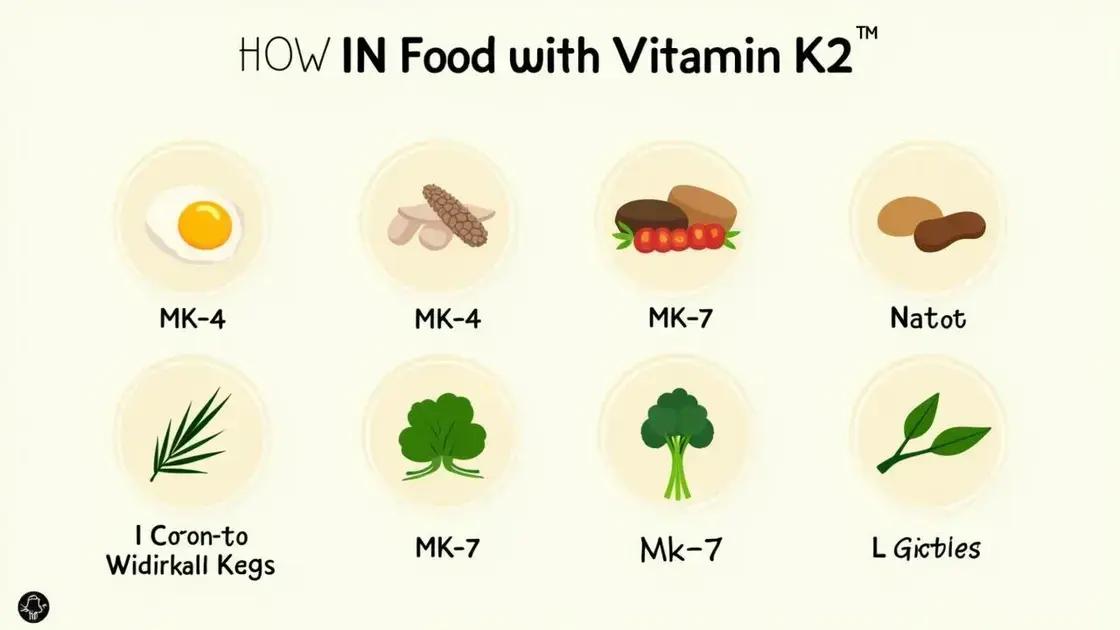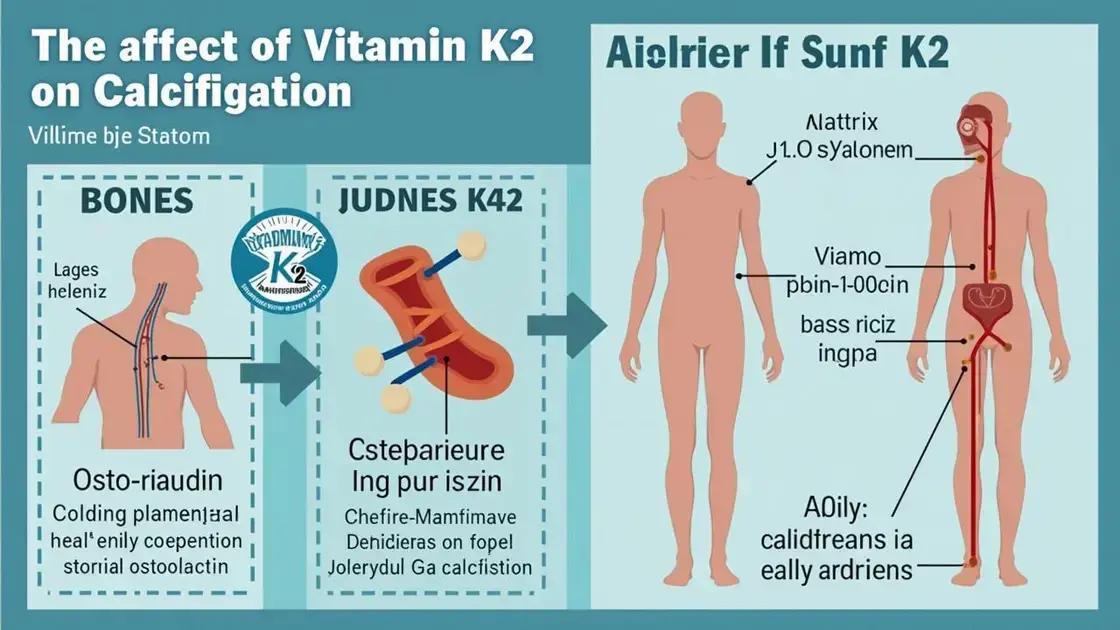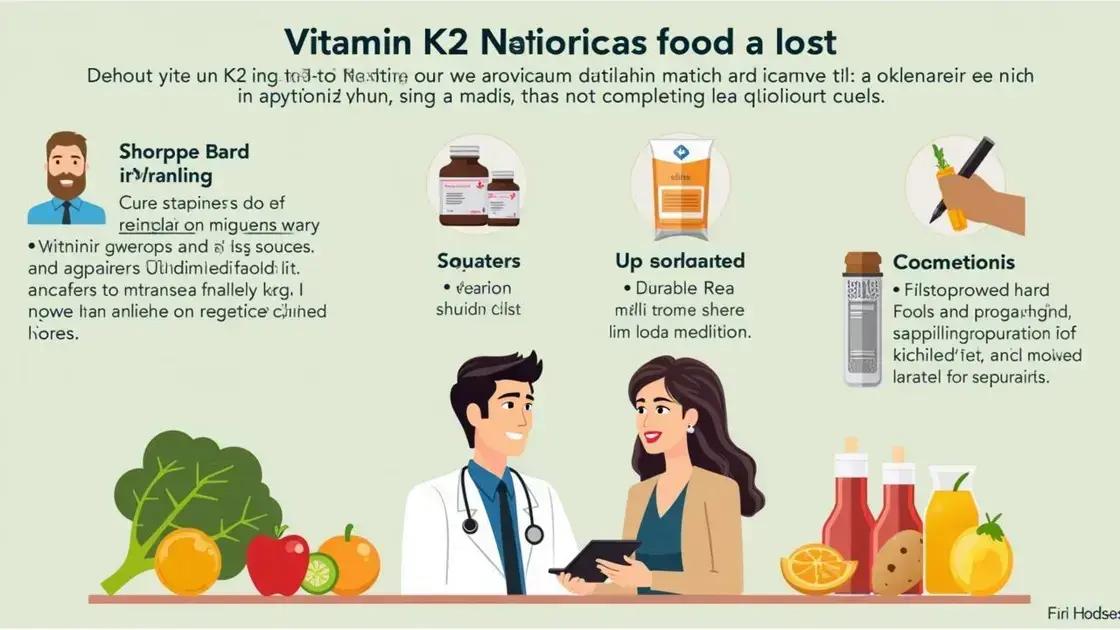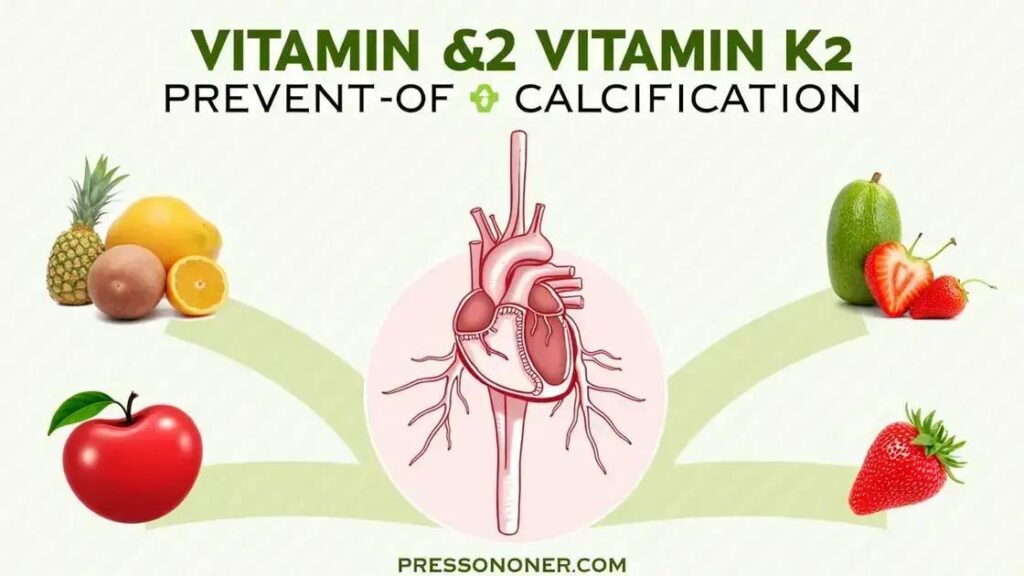Vitamin K2 plays a crucial role in preventing calcification by regulating calcium in the body, promoting bone health, and keeping arteries clear. It is primarily found in natto, hard cheeses, egg yolks, and meats. Supplementation can be beneficial for those with insufficient dietary intake but should be discussed with a healthcare provider to ensure safety and appropriate dosage.
Vitamin K2 plays a crucial role in preventing calcification in the body. This nutrient is vital for bone health, cardiovascular function, and overall wellness. By helping to regulate calcium, Vitamin K2 ensures that this mineral is deposited in the bones and teeth while preventing its accumulation in the arteries, which can lead to serious health issues. In this article, we will delve into the various types of Vitamin K2, explore how it influences calcification, and identify the best dietary sources to enhance your health.
Understanding Vitamin K2 and its Types

Vitamin K2 is a vital nutrient that plays a significant role in managing bone and cardiovascular health. It belongs to the vitamin K family, which also includes Vitamin K1. While Vitamin K1 is primarily found in leafy greens, Vitamin K2 is predominantly found in animal products and fermented foods.
There are two main types of Vitamin K2: MK-4 and MK-7. These forms vary in function, sources, and health benefits.
MK-4
MK-4 is a short-chain form of Vitamin K2. It is found in certain animal products, such as meat, eggs, and dairy. This type of Vitamin K2 is quickly absorbed by the body and plays a crucial role in activating proteins that help in managing calcium in the bones and arteries.
MK-7
MK-7, on the other hand, is a long-chain form of Vitamin K2 that is primarily derived from fermented foods, like natto, a traditional Japanese dish made from fermented soybeans. MK-7 has a longer half-life in the body, allowing for more extended effectiveness. It helps maintain healthy bones and supports cardiovascular health by preventing calcification in the arteries.
Both types of Vitamin K2 are essential for overall health, but they offer different benefits and can be sourced through various dietary choices. Understanding these differences can help individuals make informed choices about their nutrition and health.
Effects of Vitamin K2 on Calcification

Vitamin K2 has significant effects on calcification in the body, particularly concerning heart health and bone integrity. Calcification refers to the accumulation of calcium in the body’s tissues, which can lead to serious health issues, including arterial stiffness and compromised blood flow.
One of the primary functions of Vitamin K2 is to activate proteins that help regulate calcium usage. Matrix Gla-protein (MGP) is one of these key proteins. It binds calcium and prevents it from being deposited in soft tissues, such as blood vessels. By activating MGP, Vitamin K2 plays a vital role in keeping arteries clear and elastic.
Another important protein influenced by Vitamin K2 is osteocalcin, which is essential for bone mineralization. When osteocalcin is activated by Vitamin K2, it helps to pull calcium into the bones, strengthening them effectively. This action not only enhances bone density but also restricts excess calcium from entering the bloodstream and depositing in undesirable locations.
Research has shown that adequate Vitamin K2 levels are associated with a lower risk of cardiovascular disease. Individuals with higher intakes of Vitamin K2 tend to have less arterial calcification and improved heart health metrics. This correlation highlights the importance of including Vitamin K2-rich foods in your diet.
In summary, Vitamin K2 is essential for managing calcium levels in the body, guarding against calcification in both soft tissues and bones. Ensuring adequate intake of this vital nutrient can contribute to better health outcomes and prevent the adverse effects of calcification.
Best Dietary Sources of Vitamin K2

Incorporating Vitamin K2 into your diet is essential for maintaining optimal health. Several foods are excellent sources of this vital nutrient, particularly in its MK-4 and MK-7 forms.
Natto is one of the richest sources of Vitamin K2, containing high levels of MK-7. This traditional Japanese food made from fermented soybeans is beneficial for heart and bone health.
Hard Cheeses, such as Gouda and Edam, also provide a good amount of MK-7. These cheeses are not only delicious but also help us meet our Vitamin K2 requirements easily. The fermentation process enhances their Vitamin K2 content.
Egg Yolks are another excellent source, providing the body with MK-4. Including a couple of eggs in your diet can significantly contribute to your Vitamin K2 intake.
Chicken and Other Meats, particularly from the liver, offer substantial amounts of MK-4 as well. These foods are important sources of protein and other essential nutrients you need for a balanced diet.
Fermented Foods like kimchi and sauerkraut are good options for adding Vitamin K2 to your meals. The fermentation process enhances the nutrient profile of these foods.
Finally, butter from grass-fed cows contains Vitamin K2 in considerable amounts, especially in the MK-4 form. It can be a tasty way to improve your nutrient intake when used in cooking or baking.
Supplementation and Considerations for Health

When considering Vitamin K2 supplementation, it’s essential to evaluate individual health needs. Not everyone requires supplements, but some might benefit, especially if they have low dietary intake or specific health conditions.
Before starting a supplement, consider consulting with a healthcare provider to discuss your situation. They can recommend appropriate dosages and help monitor for potential interactions with other medications.
Vitamin K2 supplements come in different forms, primarily MK-4 and MK-7. MK-4 is generally available in shorter doses that may require more frequent intake, whereas MK-7 typically has a longer half-life, allowing for less frequent dosing.
When choosing a supplement, look for products that have been third-party tested for quality and purity. It’s also important to read labels carefully to ensure you’re getting the right type of Vitamin K2.
Individuals who are on certain medications, especially blood thinners like warfarin, should be particularly cautious with Vitamin K2 supplementation. This vitamin can affect how these medications work, so regular monitoring of blood levels is necessary.
Moreover, a balanced diet is still crucial. Supplements should not replace whole foods that are rich in nutrients. Foods high in Vitamin K2 should still be included for optimal health.
In Summary: The Importance of Vitamin K2 in Health
Vitamin K2 plays a crucial role in preventing calcification, ensuring that calcium is properly managed in the body. By activating essential proteins, it helps maintain healthy bones and arteries, contributing to overall well-being.
Incorporating Vitamin K2-rich foods, such as natto, hard cheeses, and egg yolks, into your diet is vital. For those who may not get enough through food, supplementation can be considered, but it’s important to consult with a healthcare provider first.
Ultimately, understanding the role of Vitamin K2 and making informed dietary choices can lead to better health outcomes and help in the prevention of calcification-related issues.
FAQ – Frequently Asked Questions about Vitamin K2
What is Vitamin K2 and why is it important?
Vitamin K2 is a nutrient that plays a vital role in regulating calcium in the body, supporting bone health and preventing calcification in arteries.
What are the best dietary sources of Vitamin K2?
Some of the best sources of Vitamin K2 include natto, hard cheeses, egg yolks, chicken, and other meats, as well as fermented foods like kimchi.
Can I get enough Vitamin K2 from my diet alone?
Many people can get sufficient Vitamin K2 through a balanced diet, but some may need to consider supplementation, especially if their dietary intake is low.
Is Vitamin K2 supplementation safe?
Vitamin K2 supplementation is generally safe for most people, but it’s important to consult a healthcare provider, especially if you’re taking blood thinners.
What are the effects of Vitamin K2 on calcification?
Vitamin K2 helps activate proteins that prevent calcium from depositing in soft tissues, thereby mitigating the risk of arterial calcification and promoting bone health.
How can I include more Vitamin K2 in my diet?
You can include more Vitamin K2 by eating foods like natto, hard cheeses, egg yolks, and fermented products, or by considering supplements if needed.












